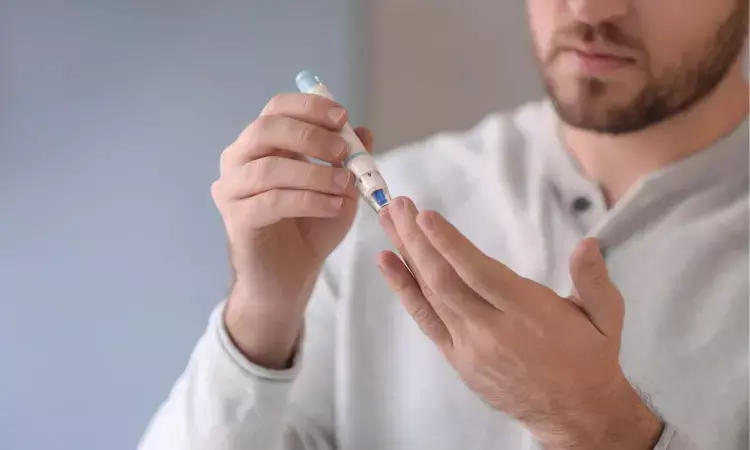- Home
- Medical news & Guidelines
- Anesthesiology
- Cardiology and CTVS
- Critical Care
- Dentistry
- Dermatology
- Diabetes and Endocrinology
- ENT
- Gastroenterology
- Medicine
- Nephrology
- Neurology
- Obstretics-Gynaecology
- Oncology
- Ophthalmology
- Orthopaedics
- Pediatrics-Neonatology
- Psychiatry
- Pulmonology
- Radiology
- Surgery
- Urology
- Laboratory Medicine
- Diet
- Nursing
- Paramedical
- Physiotherapy
- Health news
- Fact Check
- Bone Health Fact Check
- Brain Health Fact Check
- Cancer Related Fact Check
- Child Care Fact Check
- Dental and oral health fact check
- Diabetes and metabolic health fact check
- Diet and Nutrition Fact Check
- Eye and ENT Care Fact Check
- Fitness fact check
- Gut health fact check
- Heart health fact check
- Kidney health fact check
- Medical education fact check
- Men's health fact check
- Respiratory fact check
- Skin and hair care fact check
- Vaccine and Immunization fact check
- Women's health fact check
- AYUSH
- State News
- Andaman and Nicobar Islands
- Andhra Pradesh
- Arunachal Pradesh
- Assam
- Bihar
- Chandigarh
- Chattisgarh
- Dadra and Nagar Haveli
- Daman and Diu
- Delhi
- Goa
- Gujarat
- Haryana
- Himachal Pradesh
- Jammu & Kashmir
- Jharkhand
- Karnataka
- Kerala
- Ladakh
- Lakshadweep
- Madhya Pradesh
- Maharashtra
- Manipur
- Meghalaya
- Mizoram
- Nagaland
- Odisha
- Puducherry
- Punjab
- Rajasthan
- Sikkim
- Tamil Nadu
- Telangana
- Tripura
- Uttar Pradesh
- Uttrakhand
- West Bengal
- Medical Education
- Industry
Lobeglitazone could be promising insulin sensitizer for management of type 2 diabetes in India: SENSITIZE INDIA trial

India: Findings from a randomized, double-blind, phase III SENSITIZE INDIA trial have revealed the safety and efficacy of lobeglitazone 0.5 mg once daily for treating type 2 diabetes mellitus (T2DM) in the Indian population.
The study, published in JAPI: Journal of the Association of Physicians of India, showed that lobeglitazone significantly improved glycemic parameters and was noninferior to pioglitazone; hence, considered a promising insulin sensitizer in type 2 diabetes management in India.
"The mean change from baseline in HbA1c percentage in the lobeglitazone 0.5 mg group was noninferior to that in the pioglitazone 15 mg group," the researchers reported. There were no major safety concerns. Lobeglitazone was well-tolerated and safe.
The study confirmed the safety and efficacy of lobeglitazone 0.5 mg in the Indian population.
Glycemic control is the primary goal of T2D treatment. Several orally administered glucose-lowering agents have been developed for diabetes treatment. Metformin, with its good glucose-lowering efficacy and acceptable safety profile, remains the first-line low-cost treatment option for the majority of patients. However, a large number of patients with type 2 diabetes have inadequately controlled diabetes despite treatment with metformin and require an additional glucose-lowering agent.
The primary pathophysiological flaw in type 2 diabetes is insulin resistance, and the only class of antidiabetic medications that address insulin resistance exclusively is thiazolidinediones (TZD).
The efficacy and safety of lobeglitazone sulfate, a thiazolidinedione that works by activating PPAR-α/γ dual agonist, has been reported only in the Korean population, and no study has been conducted in India. Considering this, Shashank Joshi, Lilavati Hospital and Research Centre, Mumbai, Maharashtra, India, and colleagues aimed to evaluate the efficacy and safety of lobeglitazone sulfate 0.5 mg once daily in comparison with pioglitazone 15 mg once daily in subjects with type 2 diabetes with inadequate glycemic control on metformin (≥1500 mg/ day). For this purpose, they performed a 16-week randomized, double-blind, and multicenter study.
It included 328 subjects with type 2 diabetes with ≥7.5% glycated haemoglobin (HbA1c) ≤10.5% and on stable metformin dose. They were assigned to both the treatment arms. The study's primary outcome was a mean change in HbA1c.
Safety assessments included home-based glucose monitoring, adverse events (AE), vital parameters, electrocardiogram (ECG), and laboratory assessments.
The study led to the following findings:
- There was a statistically significant reduction in HbA1c at week 16 in the lobeglitazone group with the least square (LS) mean change of 1.01.
- The LS mean difference between the two groups was 0.05, which was statistically significant.
- There were statistically significant reductions in fasting and postprandial glucose.
- Treatment-emergent adverse events (TEAE) were comparable between both groups.
"This trial, the first on lobeglitazone in Indian patients, revealed that lobeglitazone was just as effective as pioglitazone (15 mg) in treating metformin-uncontrolled T2D in Indian patients without posing a significant risk to safety," the research team wrote.
"Lobeglitazone was found to be noninferior to pioglitazone concerning change in fasting insulin, HOMA-β, and HOMA-IR; hence, it may be a promising insulin sensitizer for diabetes management in India," they concluded.
Reference:
Joshi S, Tandon M, Kodgule R, et al. Randomized, Double-blind, Phase III Trial of Lobeglitazone Add-on to Metformin in Type 2 Diabetes (SENSITIZE INDIA). J Assoc Physicians India 2024;72(1): 32–42
Dr Kamal Kant Kohli-MBBS, DTCD- a chest specialist with more than 30 years of practice and a flair for writing clinical articles, Dr Kamal Kant Kohli joined Medical Dialogues as a Chief Editor of Medical News. Besides writing articles, as an editor, he proofreads and verifies all the medical content published on Medical Dialogues including those coming from journals, studies,medical conferences,guidelines etc. Email: drkohli@medicaldialogues.in. Contact no. 011-43720751


